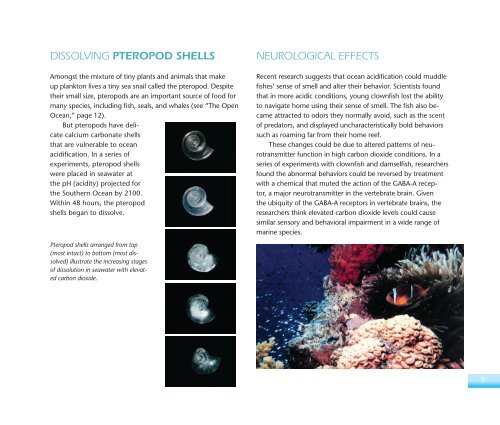OCEAN ACIDIFICATION Starting with the Science
SUMMARY DOCUMENT-Ocean Studies Board The National Academies—the National Academy of Sciences
SUMMARY DOCUMENT-Ocean Studies Board The National Academies—the National Academy of
Sciences
You also want an ePaper? Increase the reach of your titles
YUMPU automatically turns print PDFs into web optimized ePapers that Google loves.
DISSOLVING PTEROPOD SHELLS<br />
Amongst <strong>the</strong> mixture of tiny plants and animals that make<br />
up plankton lives a tiny sea snail called <strong>the</strong> pteropod. Despite<br />
<strong>the</strong>ir small size, pteropods are an important source of food for<br />
many species, including fish, seals, and whales (see “The Open<br />
Ocean,” page 12).<br />
But pteropods have delicate<br />
calcium carbonate shells<br />
that are vulnerable to ocean<br />
acidification. In a series of<br />
experiments, pteropod shells<br />
were placed in seawater at<br />
<strong>the</strong> pH (acidity) projected for<br />
<strong>the</strong> Sou<strong>the</strong>rn Ocean by 2100.<br />
Within 48 hours, <strong>the</strong> pteropod<br />
shells began to dissolve.<br />
NEUROLOGICAL EFFECTS<br />
Recent research suggests that ocean acidification could muddle<br />
fishes’ sense of smell and alter <strong>the</strong>ir behavior. Scientists found<br />
that in more acidic conditions, young clownfish lost <strong>the</strong> ability<br />
to navigate home using <strong>the</strong>ir sense of smell. The fish also became<br />
attracted to odors <strong>the</strong>y normally avoid, such as <strong>the</strong> scent<br />
of predators, and displayed uncharacteristically bold behaviors<br />
such as roaming far from <strong>the</strong>ir home reef.<br />
These changes could be due to altered patterns of neurotransmitter<br />
function in high carbon dioxide conditions. In a<br />
series of experiments <strong>with</strong> clownfish and damselfish, researchers<br />
found <strong>the</strong> abnormal behaviors could be reversed by treatment<br />
<strong>with</strong> a chemical that muted <strong>the</strong> action of <strong>the</strong> GABA-A receptor,<br />
a major neurotransmitter in <strong>the</strong> vertebrate brain. Given<br />
<strong>the</strong> ubiquity of <strong>the</strong> GABA-A receptors in vertebrate brains, <strong>the</strong><br />
researchers think elevated carbon dioxide levels could cause<br />
similar sensory and behavioral impairment in a wide range of<br />
marine species.<br />
Pteropod shells arranged from top<br />
(most intact) to bottom (most dissolved)<br />
illustrate <strong>the</strong> increasing stages<br />
of dissolution in seawater <strong>with</strong> elevated<br />
carbon dioxide.<br />
9


